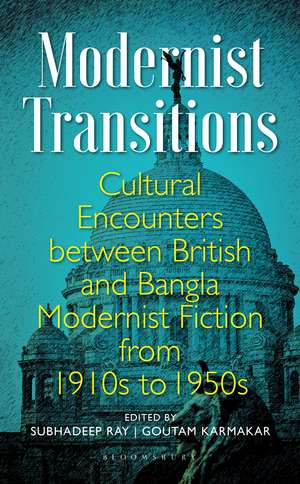Modernist Transitions: Cultural Encounters between British and Bangla Modernist Fiction from 1910s to 1950s
Editat de Subhadeep Ray, Goutam Karmakaren Limba Engleză Hardback – 29 dec 2023
Preț: 509.52 lei
Preț vechi: 730.68 lei
-30% Nou
Puncte Express: 764
Preț estimativ în valută:
97.50€ • 101.59$ • 80.73£
97.50€ • 101.59$ • 80.73£
Carte disponibilă
Livrare economică 13-27 martie
Preluare comenzi: 021 569.72.76
Specificații
ISBN-13: 9789356404380
ISBN-10: 9356404380
Pagini: 260
Dimensiuni: 135 x 216 mm
Greutate: 0.45 kg
Editura: Bloomsbury Publishing
Colecția Bloomsbury Academic India
Locul publicării:New Delhi, India
ISBN-10: 9356404380
Pagini: 260
Dimensiuni: 135 x 216 mm
Greutate: 0.45 kg
Editura: Bloomsbury Publishing
Colecția Bloomsbury Academic India
Locul publicării:New Delhi, India
Caracteristici
Essays aspire to illuminate thematic and structural areas where these two kinds of literary modernism interact with each other to constitute an 'aesthetics of motion and dissonance'
Notă biografică
Subhadeep Ray is Associate Professor in the Department of English, Bidhan Chandra College, Kazi Nazrul University, Asansol, India, and Visiting Professor at the Department of English, Kazi Nazrul University, Asansol, India.Goutam Karmakar is an NRF Postdoctoral Fellow at the University of the Western Cape, South Africa.
Cuprins
Foreword: Transitioning To and From Modernism - Pramod K Nayar Introduction: ScopesandLimitsof ModernistTransitions in the British- Bangla Context - SubhadeepRayandGoutamKarmakar PartI: SettingtheParadigms: NationsandNarrations - - Editors' Introduction 1:ModernistWriters'(post)ColonialConnections: Aesthetics, Ethics, andPolitics- AmarAcheraiou 2:TheDiscoveryofF-ailingIndia: NehruandtheIndian Modernity- RitwickBhattacharjee 3: Bengali Modernist Fiction: Looking Through the Canon- Angshuman Kar 4:OnHeroWorshipandOurModernity: AReappraisalofDilip KumarRoy'sSelectMemoirs - SantanuBanerjee PartII:'Everythingistheproperstuffoffiction':Intersections of Modernism and Realism in Narratives of Corporeality, Subjectivity, Alienation and War - Editors'Introduction 5:Modernity and Tradition in Select Fiction of Bonophul and Lawrence on Health, Illness and Treatment - SupritiDebnath 6:RevelationsinTextuality:Approachingthe'Literary'in Manada Devi's An Educated Woman in Prostitution and Katherine Mansfield's 'TheSingingLesson'- JemimaNasrin 7:FromDedalustoDhorai:ReadingModernistAlienationin James Joyce's Ulysses and Satinath Bhaduri's Dhorai Charit Manas - BipranarayanBhattacharyya 8:ModernismfromtheMargins:ReflectionsonBengaliLate-ModernismandtheSecond-World-WarViolenceinManikBandyopadhyay's'Panic'- ParthaSarathiNandi Part III: Interplay Between Traditions and Genres of Modernist and Late-Modernist Fiction - Editors' Introduction 9:DidtheTwainMeet?:ModernismandChildren'sLiterature inTwentiethCentury BritainandBengal - StellaChitralekhaBiswas 10:DomesticModernism:Situating(Anti)HomeinWritingsof VirginiaWoolfand RokeyaSakhawatHossain - NilanjanaChatterjee, NibeditaMukherjee, and AninditaChatterjee 11: The Pitmen's Union: A Comparative Study of SelectCoalmineFictionsofD.H. LawrenceandSailajanandaMukhopadhyay - AratrikaGanguly 12:Modernism's Illegitimate Offspring: Genre Tropes, Detective Fiction, and Sharadindu Bandyopadhyay's Byomkesh Bakshi Series - AnimeshBag
Recenzii
Modernist Transitions: Cultural Encounters between British and Bangla Modernist Fiction from 1910s to 1950s is a much-awaited book. Bangla has always been known to reflect and even resist Western literary influencesthrough phases of its rich literary tradition. Hence a book that studies one of the major movements in Western literature-that of modernism- and compares both English and Bangla texts with reference to modernistissues and tropes is definitely worth the wait. An area of research that several scholars would have pondered over has finally been given shape by Subhadeep Ray and Goutam Karmakar in this book. A must-read forscholars and students interested in research in both English and Bangla and its comparative studies.
This innovative collection sheds new light on important questions across a number of disciplinary fields including history, postcolonial and literary studies. It raises new perspectives on modernism, imperialism, nationalism and cosmopolitanism.
The histories of Bangla and Britain have long been intertwined-both are key sites in the experience of modernity, industrialisation, empire and its postcolonial consequences. Both, as a consequence, produced in the 20th-century, rich literature that documented and imagined that experience. But there is also an asymmetry-for while English literature is well studied in Bangla, Bangla literature is not studied in Britain to the same extent. This collection of critical essays offers the opportunity to correct this asymmetry, and to consider the literatures of modernity across these two sites not just in comparison, but in complement to one another, opening discussions about nation and narration, intersections between autobiography and fiction, realism, literature and the domestic, and transitions away from colonial and postcolonial tropes. This volume will open up a new world of writing to many readers, and to others, set what they know in a new, and global, perspective.
This innovative collection sheds new light on important questions across a number of disciplinary fields including history, postcolonial and literary studies. It raises new perspectives on modernism, imperialism, nationalism and cosmopolitanism.
The histories of Bangla and Britain have long been intertwined-both are key sites in the experience of modernity, industrialisation, empire and its postcolonial consequences. Both, as a consequence, produced in the 20th-century, rich literature that documented and imagined that experience. But there is also an asymmetry-for while English literature is well studied in Bangla, Bangla literature is not studied in Britain to the same extent. This collection of critical essays offers the opportunity to correct this asymmetry, and to consider the literatures of modernity across these two sites not just in comparison, but in complement to one another, opening discussions about nation and narration, intersections between autobiography and fiction, realism, literature and the domestic, and transitions away from colonial and postcolonial tropes. This volume will open up a new world of writing to many readers, and to others, set what they know in a new, and global, perspective.
